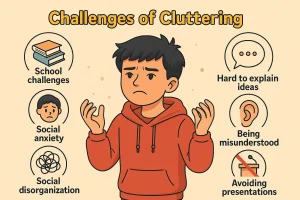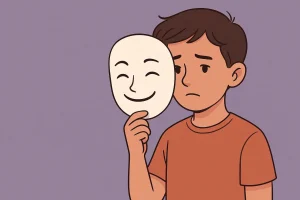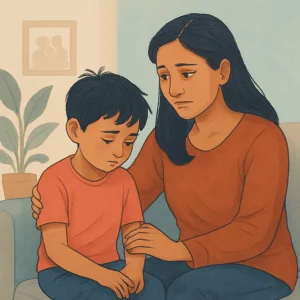10 Fun WH Questions Activities to Try With Your Kids at Home
By Wellness Hub
Last Updated: February 15, 2025
Ever wondered how to spark curiosity and improve your child’s communication skills? WH questions—Who, What, Where, When, Why, and How—are the key to developing critical thinking, problem-solving, and social skills from an early age.
This guide is packed with easy, hands-on activities designed for kids aged 3-8, making learning interactive and fun. Whether at home or on the go, these games will transform everyday moments into engaging learning experiences—no extra prep required!
What’s inside? 10 exciting WH questions games that boost language development while keeping kids entertained. Get ready to make learning feel like play
1. Picture Prompt Questions for Kids (Ages 3-6)
Children are natural storytellers! By asking them engaging WH questions about pictures, you can boost their observation skills, expand vocabulary, and strengthen their ability to express thoughts clearly. Whether using flashcards, picture books, or magazine images, these simple prompts turn any moment into a fun learning experience!
How It Works:
Choose an image and ask your child these 10 thought-provoking WH questions:
- Who is in the picture?
- Where is this happening?
- What is the person doing?
- Why do you think they are doing that?
- When do you think this happened?
- How do you think they feel?
- What else do you see in the picture?
- What do you think will happen next?
- If you were there, what would you do?
- Can you make up a story about this picture?
Why It’s Great:
- Enhances critical thinking
- Encourages observation and imagination
- Strengthens communication and storytelling
2. Storytelling WH Questions Game (Ages 4-8)
Every child loves a good story, but what if you could turn story time into an exciting game that sharpens their thinking skills? The Storytelling WH Questions Game does just that! Designed for kids aged 4-8, this interactive activity transforms passive listening into an engaging experience, helping young minds develop comprehension, sequencing, and problem-solving skills.
How It Works:
As you read a short story, pause at key moments to ask thought-provoking WH questions, encouraging your child to think deeper about the characters, events, and outcomes. Here are 10 engaging WH questions to try:
- Why did the character do that?
- When will the problem be solved?
- What happens next?
- Who is the main character trying to help?
- Where do you think the character will go next?
- Why do you think the character made that choice?
- When did the character realize something was wrong?
- What would you do if you were in the story?
- Who do you think will solve the problem?
- Where would the story be different if it happened in another place?
Why It’s Great:
This game boosts listening comprehension, sequencing, and critical thinking skills, making it a perfect addition to bedtime stories or learning time.
Also read: What Age Should a Child Answer WH Questions?
3. WH Question Scavenger Hunt (Ages 3-7)
Want to make learning WH questions exciting and interactive? A WH Question Scavenger Hunt is the perfect way to boost your child’s critical thinking, listening, and problem-solving skills—all while having fun! This engaging activity transforms everyday objects into clues, encouraging kids to explore, ask questions, and discover answers through play.
How It Works
Hide objects around the house and challenge your child to find them using WH questions. Instead of simply telling them what to look for, guide them with thought-provoking prompts that make them think, move, and respond.
Here are 10 WH question examples to get you started:
- Where is the teddy bear?
- Who found the hidden ball?
- What is hiding under the couch?
- Why do you think the toy car is in the kitchen?
- When did you last see the stuffed bunny?
- How can you reach the book on the shelf?
- Which object is behind the pillow?
- Whose toy is under the table?
- What color is the hidden block?
- Why do you think the doll is near the door?
Why It’s Great
This scavenger hunt isn’t just a game—it’s a powerful learning tool that helps children:
- Improve problem-solving – They must think critically to locate objects.
- Develop language skills – Practicing WH questions strengthens communication.
- Enhance listening skills – They must listen carefully to the clues.
- Encourage movement – Kids stay active while searching for objects.
4. Role-Playing With WH Questions (Ages 4-8)
Children love to pretend, and role-playing taps into their imagination while building essential language skills. When kids take on the role of a doctor, chef, or teacher, they’re not just having fun—they’re learning! Adding WH questions to role-play turns playtime into an interactive learning experience. It strengthens vocabulary, improves communication, and enhances critical thinking. Plus, it’s an effortless way to introduce real-world concepts in a way that feels natural and exciting for young learners.
How It Works
Encourage your child to step into different roles and ask WH questions during play. Here are 10 engaging examples:
- Doctor: Who is the doctor treating?
- Chef: What do we need to bake a cake?
- Teacher: Where do students sit in the classroom?
- Firefighter: When do firefighters use a fire extinguisher?
- Police Officer: Why do we follow traffic rules?
- Astronaut: How do astronauts travel to space?
- Farmer: What do cows eat on a farm?
- Pilot: Where does a pilot fly an airplane?
- Veterinarian: Who brings pets to a vet clinic?
- Artist: Why do we mix colors to create new shades?
Why It’s Great
- Encourages creativity and imagination
- Expands vocabulary through real-world scenarios
- Strengthens problem-solving and critical thinking
- Boosts confidence in communication
Role-playing with WH questions is more than just a fun activity—it’s an educational powerhouse that helps children develop language skills in an engaging, natural way. So, grab some props, step into a new role, and watch your child’s learning soar!
Read More: Why WH Questions Matter for Kids and How to Teach Them
5. Mystery Object Guessing Game (Ages 3-6)
Children love surprises, and the Mystery Object Guessing Game turns curiosity into a learning adventure! This simple yet engaging activity sharpens your child’s ability to ask meaningful questions, make logical connections, and think critically—all while having fun.
How It Works:
- Place an object inside a bag.
- Your child takes turns asking WH questions to gather clues and guess what’s inside.
- Guide them toward logical reasoning with thoughtful responses.
- The game ends when they correctly guess the object or decide to reveal it.
Example WH Questions:
- Is it something we eat?
- What color is it?
- Where do we use this?
- Is it big or small?
- What material is it made of?
- Does it make a sound?
- Can we wear it?
- Is it used indoors or outdoors?
- What shape is it?
- Is it soft or hard?
Why It’s Great
This game isn’t just about fun—it’s a powerful learning tool that builds:
- Logical Thinking – Helps kids connect clues to form conclusions.
- Questioning Skills – Encourages curiosity and problem-solving.
- Vocabulary Development – Introduces new words and descriptive language.
- Confidence & Communication – Fosters self-expression in a playful way.
6. WH Questions Dice Game (Ages 4-8)
Children are naturally curious, and the WH Questions Dice Game is the perfect way to channel that curiosity into meaningful conversations. This engaging activity encourages kids to think critically, express their thoughts, and develop language skills—all while having fun! Whether you’re a parent, caregiver, or educator, this simple DIY game turns everyday moments into exciting learning opportunities.
How It Works
Create your own WH-question dice using a cube-shaped object (a small box, a wooden block, or even folded paper). Write different WH-questions (who, what, when, where, why, and how) on each side. Then, let the fun begin!
- Roll the dice.
- Read the question aloud.
- Take turns answering.
Here are 10 example “When” questions to spark engaging conversations:
- When do you feel happy?
- When do you wake up in the morning?
- When do you eat your favorite food?
- When do you visit your grandparents?
- When do you feel scared?
- When do you go to bed?
- When do you see a rainbow?
- When do you play with your friends?
- When do you celebrate your birthday?
- When do you hear birds chirping?
Why It’s Great
- Turns Learning into a Game – Kids absorb knowledge best when they’re engaged and having fun.
- Boosts Communication Skills – Helps children form sentences, express emotions, and expand their vocabulary.
- Perfect for Family Bonding – A great activity for game nights, road trips, or dinner table conversations.
Learn More: How to Use WH Questions in Speech Therapy – Tips for Parents
7. Daily Journal WH Prompts (Ages 5-8)
Journaling is a fantastic way to encourage young minds to express their thoughts, develop creativity, and strengthen writing skills. For kids aged 5-8, WH prompts (Who, What, Where, When, Why, and How) provide the perfect structure for daily reflections. These prompts spark curiosity, inspire storytelling, and help children process their experiences in a meaningful way.
How It Works:
Encourage kids to respond to a new WH prompt each day through writing or drawing. They can share their thoughts in words or illustrate their ideas if they aren’t fully comfortable with writing yet. This simple daily practice builds communication skills, self-awareness, and confidence.
10 Engaging WH Prompts for Daily Journaling
- What was the best part of your day?
- Where would you love to travel and why?
- Who is your favorite storybook character?
- When do you feel the happiest?
- Why do you think kindness is important?
- How would you describe your perfect day?
- What superpower would you love to have?
- Where is your favorite place to play?
- Who is someone that makes you smile?
- Why do you love your favorite hobby?
Why It’s Great:
This activity enhances writing skills, self-expression, and emotional reflection. By engaging in daily journaling, kids build vocabulary, improve sentence structure, and develop a lifelong habit of thoughtful communication. Plus, it’s a great way for parents and teachers to understand a child’s thoughts, feelings, and imagination.
8. Family Interview Game (Ages 4-8)
Looking for a delightful way to bring your family closer while helping your little ones build conversation skills? The Family Interview Game is a perfect mix of fun and learning! Designed for kids aged 4-8, this activity turns ordinary moments into exciting storytelling opportunities. Get ready for giggles, curiosity, and heartwarming answers as kids take turns being mini-journalists, asking WH questions that spark creativity and connection.
How It Works:
Each family member takes turns being interviewed with engaging WH questions like:
- Who is your favorite superhero and why?
- What is the silliest thing you have ever done?
- Where would you go if you could visit any place in the world?
- When was the last time you felt really happy?
- Why do you love your favorite holiday?
- Who makes you laugh the most, and what’s the funniest thing they’ve done?
- What is one thing you would invent if you could create anything?
- Where do you think animals go when they play hide-and-seek?
- When did you feel the bravest?
- Why do you think the sky changes colors at sunset?
Why It’s Great:
- Encourages children to practice asking and answering questions.
- Strengthens conversation skills and active listening.
- Builds family connections through storytelling.
- Boosts confidence in expressing thoughts and ideas.
Also Read: How WH Questions Help Kids Improve Their Communication Skills
9. WH Question Bingo (Ages 5-8)
Looking for a fun and interactive way to help kids master WH questions? WH Question Bingo turns learning into an exciting game, keeping young minds engaged while reinforcing essential language skills. Instead of traditional drills, this activity transforms questioning into an adventure—where every correct answer gets kids closer to a Bingo win!
How It Works
Create a Bingo card filled with different WH question prompts (Who, What, When, Where, Why, How). Kids take turns answering a question to mark off a space on their card. The first to complete a row or column shouts, “Bingo!”
Why It’s Great
- Boosts engagement – Kids actively participate instead of passively listening.
- Strengthens comprehension – Encourages deeper thinking about WH questions.
- Adds excitement – Learning feels like play, increasing motivation and retention.
10 Puppet Show or Video Challenge (Ages 4-8)
Kids love playing pretend, and this activity takes their creativity to the next level! By using WH questions, children craft engaging puppet shows or short videos that develop their storytelling, problem-solving, and language skills. Whether it’s a simple sock puppet performance or a mini movie with toys as actors, this interactive challenge keeps kids entertained while enhancing their communication abilities.
How It Works:
Have your child create a puppet show or short video by answering these WH questions:
- Who is the main character?
- What is the problem?
- Where does the story take place?
- When does the story happen—day or night, past or future?
- Why is the problem happening?
- How will the character solve the problem?
- Which other characters help or create obstacles?
- Whose idea leads to the solution?
- What happens at the end?
- How does the character feel after everything is resolved?
Why It’s Great:
- Boosts creativity and imagination
- Strengthens storytelling and sequencing skills
- Encourages confidence in speaking and expressing ideas
- Improves language development in a fun, hands-on way
Conclusion
WH questions are essential for developing strong language, critical thinking, and communication skills in young learners. These 10 fun activities make learning interactive, engaging, and easy to practice at home. By incorporating them into your daily routine, you can help your child build confidence and expand their vocabulary effortlessly. Try these activities and watch your child’s curiosity grow! Don’t forget to share the funniest WH question your child has asked in the comments.
Frequently Asked Questions
1. How do WH questions help in child development?
WH questions help children improve their language skills, comprehension, problem-solving, and critical thinking. These questions encourage kids to observe, describe, and explain things around them, which is essential for early learning.
2. Which activity from the list is best for younger kids (ages 3-4)?
The Mystery Object Guessing Game and Picture Prompt Questions are great for younger children because they involve simple observation and answering easy questions like “What is this?” and “Where is it?”
3. How can I modify these WH question activities for older kids (ages 6-8)?
For older kids, add more complex WH questions that require reasoning, prediction, or problem-solving. For example:
- In Storytelling WH Questions, ask “Why do you think the character made that choice?”
- In WH Questions Dice Game, encourage them to explain how and why rather than just answering what and where.
4. What if my child doesn’t answer WH questions correctly?
It’s normal for kids to struggle at first. You can help by:
- Providing choices (e.g., “Is the dog inside or outside?”)
- Using gestures or pictures to reinforce meaning
- Modeling correct answers and letting them repeat after you
5. How can I make these activities more interactive?
You can add props, movement, and playful elements to make them more engaging. For example:
- WH Question Scavenger Hunt: Add a timer to make it exciting.
- Puppet Show Challenge: Use actual puppets, stuffed toys, or a phone camera to record the fun.
6. Can I do these activities without any special materials?
Yes! Most of these activities use everyday items like books, household objects, toys, or even family members. For example, Family Interview Game only requires you to ask questions during a meal or playtime.
7. How often should I do these WH question activities with my child?
You don’t need to set aside special time—just incorporate them into daily routines! Ask WH questions while reading a bedtime story, playing outside, or even during snack time.
8. How do I encourage a shy child to participate in WH question activities?
Start with yes/no questions and gradually introduce WH questions. Choose activities where they feel comfortable, like Picture Prompt Questions or Daily Journal WH Prompts, where they can answer in drawings or short sentences.
9. Are these WH question activities useful for children with speech delays?
Yes! These activities can boost language development and expressive skills. Games like WH Questions Dice Game and Mystery Object Guessing Game encourage kids to speak and think critically in a low-pressure way.
10. What’s the best way to track my child’s progress in answering WH questions?
Keep a simple progress log by writing down the questions your child struggled with and noting improvements over time. You can also record their answers in a journal or use flashcards to reinforce learning. for more engaging ways to help your child build communication skills!
About the Author:
Rajini Darugupally
M.Sc., Speech-Language Pathologist (9+ years of experience)
Rajini is a passionate and dedicated Speech-Language Pathologist with over 9+ years of experience, specializing in both developmental speech and language disorders in children and rehabilitation in adults. Driven by a desire to empower each individual to find their voice, Rajini brings a wealth of experience and a warm, genuine approach to therapy. Currently, at Wellness Hub, she thrives in a team environment that values innovation, compassion, and achieving results for their clients.
Book your Free Consultation Today
Parent/Caregiver Info:
Client’s Details:
* Error Message









